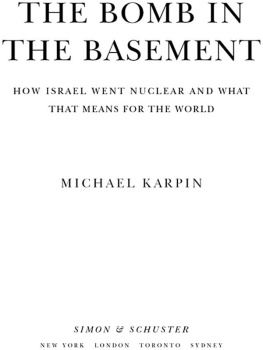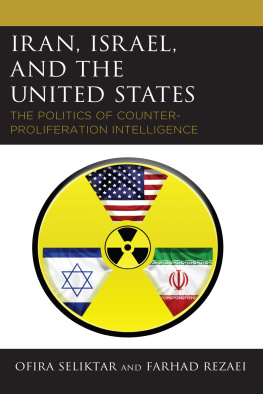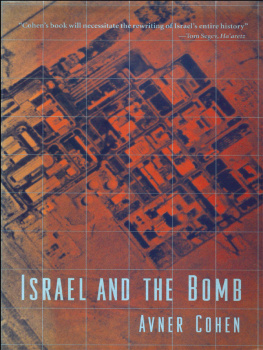Michael Karpin - The Bomb in the Basement: How Israel Went Nuclear and What That Means for the World
Here you can read online Michael Karpin - The Bomb in the Basement: How Israel Went Nuclear and What That Means for the World full text of the book (entire story) in english for free. Download pdf and epub, get meaning, cover and reviews about this ebook. year: 2006, publisher: Simon & Schuster, genre: Politics. Description of the work, (preface) as well as reviews are available. Best literature library LitArk.com created for fans of good reading and offers a wide selection of genres:
Romance novel
Science fiction
Adventure
Detective
Science
History
Home and family
Prose
Art
Politics
Computer
Non-fiction
Religion
Business
Children
Humor
Choose a favorite category and find really read worthwhile books. Enjoy immersion in the world of imagination, feel the emotions of the characters or learn something new for yourself, make an fascinating discovery.
- Book:The Bomb in the Basement: How Israel Went Nuclear and What That Means for the World
- Author:
- Publisher:Simon & Schuster
- Genre:
- Year:2006
- Rating:5 / 5
- Favourites:Add to favourites
- Your mark:
The Bomb in the Basement: How Israel Went Nuclear and What That Means for the World: summary, description and annotation
We offer to read an annotation, description, summary or preface (depends on what the author of the book "The Bomb in the Basement: How Israel Went Nuclear and What That Means for the World" wrote himself). If you haven't found the necessary information about the book — write in the comments, we will try to find it.
THE BOMB IN THE BASEMENT tells the fascinating story of how Israel became the Middle Easts only nuclear power and -- unlike Iraq and Iran -- succeeded in keeping its atomic program secret.
Veteran Israeli journalist Michael Karpin explains how Israel, by far the smallest of the nuclear powers, succeeded in its ambitious effort. David Ben-Gurion saw the need for an atomic capability to offset the numerical superiority of Arab armies at war with Israel. The Israeli program relied heavily on French assistance in its early years, until President Charles de Gaulle reduced his countrys cooperation. Once it was discovered, Israels nuclear program cast a shadow over relations between Israel and the United States. The Kennedy administration opposed it, and President Lyndon Johnson approved it only tacitly.
Significant change took place when President Richard Nixon and Secretary of State Henry Kissinger adopted a new strategy. An Israel that possessed nuclear capability was a more valuable asset to the West than an Israel without such an option. President Nixon ceased to press Israel to join the Nuclear Non-Proliferation Treaty and dropped U.S. surveillance of the Israeli reactor at Dimona. In exchange, Israel committed itself to maintain official ambiguity about its nuclear program. That policy remains in place nearly forty years later. Without American approval and the financial assistance and lobbying of Jews in North America, Israel could not have achieved its nuclear capability.
This is a fascinating story of scientists, politicians, spies, and major international personalities who all played a part in an extraordinary undertaking that continues to shape the politics of the worlds most volatile region. Today it remains to be seen whether Israel will permit Iran to build a nuclear bomb and threaten Israels security.
Michael Karpin: author's other books
Who wrote The Bomb in the Basement: How Israel Went Nuclear and What That Means for the World? Find out the surname, the name of the author of the book and a list of all author's works by series.









